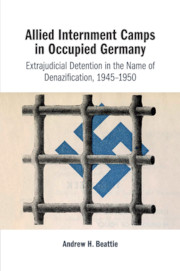 Allied Internment Camps in Occupied Germany
Allied Internment Camps in Occupied Germany The ‘Worst Nazis’ or a ‘Colourful Assortment’?
Published online by Cambridge University Press: 28 October 2019
Chapter 3 discusses the key characteristics and numbers of internees. It argues that here, too, the similarities across the zones were greater than is often assumed, but that important differences emerged. It shows that internee numbers were higher in the western zones than is often believed and that most internees in every zone were middle-aged men. The chapter examines competing claims about internees’ Nazi incrimination and distinguishes between different organizations and tiers of the Nazi Party hierarchy. It shows that there were more lowly than highly ranked personnel in every zone, but that seniority levels were higher in the western (and especially the American and British) zones and that only there were significant numbers of SS members interned. Yet one should not overlook the personnel of the broader Nazi repressive apparatus nor downplay the responsibility of even the lowest-ranked Party officials who were interned in the Soviet zone in large numbers. The chapter also argues that the Soviets interned fewer adolescents, Social Democrats, and members of other postwar political parties than is often believed and that some were targeted for Nazi-era offences. Nevertheless, their number had no equivalent in the west and even more were prosecuted by Soviet Military Tribunals.
To save this book to your Kindle, first ensure [email protected] is added to your Approved Personal Document E-mail List under your Personal Document Settings on the Manage Your Content and Devices page of your Amazon account. Then enter the ‘name’ part of your Kindle email address below. Find out more about saving to your Kindle.
Note you can select to save to either the @free.kindle.com or @kindle.com variations. ‘@free.kindle.com’ emails are free but can only be saved to your device when it is connected to wi-fi. ‘@kindle.com’ emails can be delivered even when you are not connected to wi-fi, but note that service fees apply.
Find out more about the Kindle Personal Document Service.
To save content items to your account, please confirm that you agree to abide by our usage policies. If this is the first time you use this feature, you will be asked to authorise Cambridge Core to connect with your account. Find out more about saving content to Dropbox.
To save content items to your account, please confirm that you agree to abide by our usage policies. If this is the first time you use this feature, you will be asked to authorise Cambridge Core to connect with your account. Find out more about saving content to Google Drive.